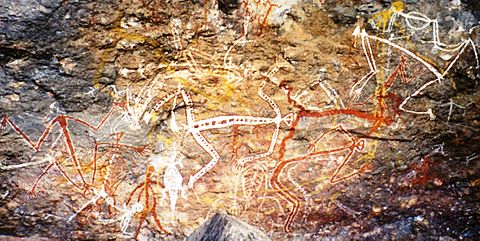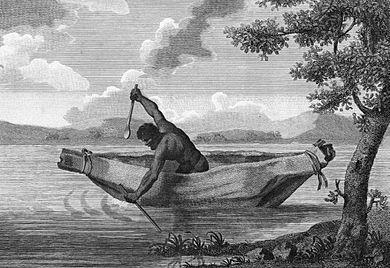Cleverman facts for kids
A cleverman is a special traditional healer and a keeper of culture in many Aboriginal communities across Australia. Their roles, names, and powers can be different depending on the specific Aboriginal nation.
Some clevermen help heal physical injuries and sicknesses. Others focus on healing spiritual problems. They use plants, songs, and deep spiritual knowledge to help people. Very powerful clevermen are believed to have magical abilities. They might heal both body and spirit. Clevermen are also experts in their community's stories and spiritual beliefs. They understand sacred places and lore, which includes cultural rules, spiritual ideas, and rituals. They have a strong connection to the Dreaming, which is a key part of Aboriginal spirituality. Clevermen can be men or women, depending on the culture.
Older clevermen choose a younger person from their community to learn from them. They teach them for many years. They also hold special, often secret, initiation ceremonies. Clevermen are highly respected members of Aboriginal communities.
The role of a cleverman is similar to traditional healers in other parts of the world. These healers are sometimes called shamans, witch-doctors, or medicine men.
When Europeans first came to Australia, the traditions of clevermen were often stopped. This was especially true by Christian missionaries. However, the practices of clevermen continue to this day.
Contents
What can clevermen do?
Clevermen may perform healing using both physical and spiritual methods. Some are believed to use special substances like quartz or pearl to do amazing things. They might also use sacred tools. For example, Wiradjuri clevermen used human hair cords to remove poisons.
Clevermen and the stars
Some clevermen, like those from the Weilwan people, know a lot about Aboriginal astronomy. They understand the stars and how they relate to their culture.
Talking with spirits
Other clevermen can talk with spirits, such as the mimih. The mimih spirits taught the marrkidjbu of the Bininj Kunwok people how to carve up a kangaroo.
Special ceremonies and powers
Some ceremonies, including those of the Wiradjuri people, involve talking with spiritual beings. These ceremonies can give clevermen special abilities. One Wiradjuri training ceremony involves calling the god Baiami to appear. Baiami then performs amazing acts, like giving "X-ray vision" or making a flame appear in a person's chest.
Some clevermen are believed to have spiritual beings living inside them. These beings help them perform supernatural acts. For example, the Wiradjuri have totemic beings, and the Yolngu have 'soul-children' that help them.
Clevermen in modern times
People outside Aboriginal communities are interested in clevermen's healing practices. Researchers want to find better ways to help Aboriginal people with their health. The practices themselves, and the cultural strength they bring, can help communities feel better. For example, Ngangkari healers are widely accepted. They often work with hospitals to heal Aboriginal patients. This traditional healing can help meet health goals for Aboriginal communities. However, ngangkari also know their powers have limits for some illnesses.
Sometimes, traditional healing beliefs can make it hard for Aboriginal patients to accept Western medicine. For example, the Yolngu peoples have a law system called Madayin. It says that all harmful magic is against the law. Some Yolngu people see legalised euthanasia as harmful magic and do not accept it. Also, language differences in hospitals can cause fear. If there are no Yolngu-speaking doctors, some Yolngu people might see medical procedures as negative magic from non-Aboriginal doctors. According to Anangu tradition, the body should not be "sliced open." This belief is linked to traditional healing and might make Anangu people refuse surgery from Western doctors.
Different names for clevermen
Different Aboriginal clans and language groups have their own names for a cleverman. Here are some of them:
- Eora nation: 'carradhy'.
- Yugambeh and Bundjalung nations: 'weeum', 'gundir', 'wuyun gali', 'wuyung', 'wiyung', or 'wuyun'.
- Galibal people: 'cooradgi'.
- Wangkangurru people: 'minparu'.
- Diyari people: 'kunki'.
- Gamilaraay nation: 'wiringin'.
- Dalabon peoples: 'marrngkidj'.
- Bininj Kunwok: 'na-kordang', or marrkidjbu (marrugeku).
- Duuŋidjawu language: 'gundir'.
- Pitjantjatjara people: 'ngangkari'.
- Yolŋu languages: 'Marrnggitj' (healers) and 'Galka' (harmful sorcerers).
- Martu peoples: 'mabarn'.
- Gunaikurnai people: mullamulliñ.
- Bidjawal people: 'mullamulliñ' (sorcerer), 'badāra' (cleverman).
- Gumbaynggirr and Yaygirr peoples: Ngaluunggirr.
- Wiradjuri or Ngiyampaa people (uncertain): wiri-ŋan, bugi-nja, ki-ki-wi-lan, walemira 'talmai.
Famous clevermen
- Pemulwuy (around 1750–1802): A Bidjigal carradhy and fighter against the British Empire in what is now Sydney.
- Jandamarra (around 1873–1897): A Bunuba cleverman who led a fight against the British Empire in the Kimberley region.
- Butcher Joe Nangan OAM (1900–1989): A jalngunguru (cleverman) and artist from Walmatjarri and Nyikina heritage. He received an award for his art.
- Bahloo: The Gamilaraay moon spirit who used to be a wiringin.
- Johnny Cudgel: A Nyoongar cultural hero and bulyagaduk. It was said he could turn into a crow to escape prison on Wadjemup (Rottnest Island).
- Kevin Djimarr: A Kuninjku man of the Kurulk clan. He is a na-kordang and a singer. He won an award for traditional music in 2007.
- Wally Mandarrk (1915-1987): A Barabba marrkdijbu from Arnhem Land. He was known for healing the sick and talking with spirits. He was also a skilled bark painter.
- Paddy Compass Namadbara (around 1892–1978): A talented Western Arnhem bark painter. He was thought to be one of the most powerful marrkidjbu and leaders of his time.
- Moolbong (1868-1943): The last wiri-ŋan of the Ngiyampaa people. He lived among the Wiradjuri after being moved by the Australian Government. He was a skilled stockman and a powerful cleverman. His singing was very strong, and some recordings are kept by AIATSIS.
Clevermen in stories
The ABC TV show Cleverman shows a superhero cleverman. It mixes traditions from different clans' clevermen roles with 'hairy man' creatures. However, 'hairy men' or 'yowies' are different creatures in Aboriginal traditions and are not always linked to clevermen.
Other similar roles
- Kurdaitcha or 'featherfoot': A traditional spiritual lawman in the Arrernte culture and other Aboriginal cultures. They are sometimes linked to harmful magic.
- Ngangkari: Traditional healers in Aṉangu culture. They are often seen as similar to 'clevermen'.
See also
- Cleverman (TV series)
- Australian Aboriginal religion and mythology
- Australian Aboriginal culture
- Australian Aboriginal English
- Maban
- Nocebo
 | Sharif Bey |
 | Hale Woodruff |
 | Richmond Barthé |
 | Purvis Young |



